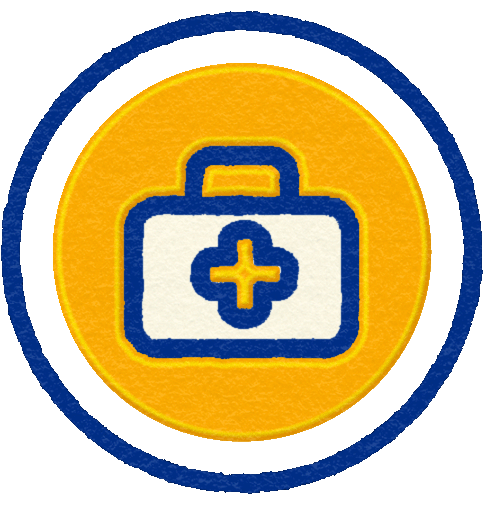Healthcare Provider Partnerships
We partner with hospitals, health systems, physician groups and other providers to erase unpaid medical debts.
Why Partner with Us?
Undue can be a valuable partner and supplement your community and financial assistance work.
Hospitals provide charity care, but many people fall through the cracks and still owe problematic medical debt—in some cases years after services were provided.
We offer a unique solution to this problem. We are a donor-supported, national charity that abolishes medical debt for people experiencing financial hardship. We give resources and analysis to over-stretched providers on a confidential basis.
A holistic approach to healthcare
Medical debt is a social determinate of health and can undermine a patient’s progress. Undue can help you treat the whole person.

212
providers have erased patient debt

o
patients collected on or sent to collections
“I do not treat a fever chart, a cancerous growth, but a sick human being, whose illness may affect the person’s family and economic stability. My responsibility includes these related problems, if I am to care adequately for the sick.”
— Dr. Louis Lasagna’s widely accepted 1964 revision of the Hippocratic oath
Our Process
Our solution benefits patients, healthcare providers and communities. We work directly with providers, including many that have been reluctant to sell patient accounts. By donating or selling patient accounts they can:
- Earn revenue from dormant bad debt without subjecting patients to collections actions.
- Address a major social determinant of health/health equity issue.
- Identify opportunities to refine charity care programs and better serve their communities.
OIG Advisory Opinion
The Advisory Opinion states that the Office of the Inspector General, Health & Human Services, will not impose sanctions under federal anti-kickback or civil monetary penalty laws when Undue works directly with healthcare organizations, hospitals or large, independent physician groups (with more than 50 practitioners) to acquire unpaid Qualified Medical Debt after the provider completes its customary collection efforts.
This Advisory Opinion should provide healthcare organizations welcome guidance and an important measure of comfort that they can donate or sell qualifying medical debts to Undue consistent with federal compliance considerations.
“By removing this burden of old debt, we hope to better engage with our patients, so they access care and other services when they need them without the fear of unmanageable expenses.”
Anthony Keck
Chief Population Health Officer
Ballad Health

“We had a very positive experience working with Undue Medical Debt. Forgiving so much patient debt for financially vulnerable patients highlighted to our organization that we really do live our values of providing great patient care and supporting our community. The whole team was really inspired by this partnership.”
Gregg Miller
Chief Medical Officer
Vituity


Frequent Questions
What are the acquisition steps?
We have designed a transparent, efficient and user-friendly process for healthcare organizations. Staff from Undue’s Debt Operations and Information Systems divisions work with staff from the healthcare organization on data file specifications and transmission.
About Undue
How does Undue work?
Undue raises funds donated by individuals, faith-based organizations, foundations, corporations and others. In December 2020, after a careful vetting process, philanthropist Mackenzie Scott provided a transformative $50 million gift to Undue. Under the oversight of a volunteer board, Undue uses these funds to analyze and acquire medical debt and then to abolish the outstanding balances for households experiencing financial hardship.
Undue can abolish 8 to 10 times more medical debt (per dollar of donor funds) when healthcare organizations donate (rather than sell) accounts for abolishment.
Undue does not engage in any collections actions. It never contacts patients with collections letters or calls. The only communication that patients receive from Undue is a letter telling them that their debt has been cancelled.
How is Undue different from commercial debt buyers?
Undue is not a debt buyer – it is a Debt Abolisher. Undue applies some of the same administrative techniques that are used by commercial debt buyers, but that’s where the similarities end.
Unlike commercial debt buyers, Undue:
- Does not engage in collections actions. It never contacts patients with collections calls or letters. The only communication that patients receive is a letter telling them that their debt has been cancelled.
- Prefers to acquire medical debt through donations rather than purchases. Acquiring accounts by donation dramatically increases the leverage of donor funds and the amount of debt Undue can abolish for patients, families and communities.
- Does not have a profit motive. As a 501(c)(3) charity, Undue receives tax-deductible philanthropic support from individuals and organizations.
- Is able to abolish patient debt without creating a tax liability for the patient.
Debt Relief
Why is medical debt a problem?
Medical debt typically results from unplanned, unexpected illnesses and accidents. About one-third of U.S. adults have difficulty covering unexpected expenses including out-of-pocket spending for healthcare; medical debt is the leading cause of bankruptcy in the U.S. The burden of medical debt has grown along with the cost of healthcare in the U.S. and the prevalence of high-deductible insurance plans.
Patients with burdensome medical debt often delay the care they need because they fear incurring even more debt.
How does Undue define “financial hardship”?
Undue’s financial hardship criteria for medical debt abolishment are as follows:
- Income: The patient’s (or guarantor’s) household income is at or below 400% of the current federal poverty guidelines, or
- Medical Debt Burden: Medical debt represents 5% or more of gross household income
How does Undue establish people’s “financial hardship”?
Through a partnership with FinThrive, Undue accesses third-party information about estimated household income, liabilities and assets and then applies its financial hardship criteria to identify medical debt that qualifies for abolishment.
These medical debts have remained uncollected 1 to 7+ years after the patient received services. Collections actions on the accounts generally have ceased and outstanding balances have been written off as bad debt. These write-offs by providers are only an internal accounting step. Even though these debts have been written off by the healthcare organization, they are still legally owed. Patients tell Undue that they have felt stress from these unpaid debts and avoided necessary care for fear of more debt. In some cases it has affected their credit reports for years until Undue abolishes them.
Working With Undue
Why do healthcare organizations work with Undue?
By working with Undue, healthcare organizations:
Mission Reasons
- Address significant social determinants of health and enhance community wellbeing. Many tax-exempt healthcare organizations have identified addressing these issues as mission-critical.
- Help assure that financial assistance is provided for patients experiencing hardship who (for whatever reason) were not identified as eligible for charity care through the routine revenue cycle process or whose finances deteriorated after the opportunity to apply has expired.
- Use data from Undue’s analysis to change financial assistance processes and identify more charity care in the future.
- Demonstrate their commitment to mission, particularly if they donate accounts.
- Help Undue abolish 8 to 10 times more debt if they donate rather than sell accounts.
Business Reasons
- Bring new resources into their communities from donors who are committed to abolishing medical debt.
- Receive cash flow and revenue based on industry-standard fair market valuation from dormant accounts that have been fully written off (if the organization decides to sell, rather than donate, some or all accounts to Undue).
- Integrate a state-of-the-art step into the revenue cycle process.
- Identify opportunities to refine financial assistance policies and how they are administered.
- Avoid ongoing operational responsibility for (and the financial statement impact from) unpaid, difficult-to-collect, dormant accounts.
- Enhance patients’ ability to afford and pay future medical bills.
Is Undue likely to find qualifying medical debts if the healthcare organization has a generous financial assistance policy?
Some healthcare organizations have a comparatively generous Financial Assistance (charity care) Policy. They provide charity care discounts for households up to 400% or 500% of federal poverty guidelines and may also use third-party information to grant charity on a presumptive basis.
Even in these circumstances, Undue finds many patient accounts that meet its financial hardship criteria:
- Even if a healthcare organization has a generous policy, if they depend on applications, many eligible patients won’t apply. Even if a third-party presumptive tool is used, it is typically only used for uninsured patients. Most hospital bad debt is now for the insured.
- Undue typically acquires patient accounts that are 1+ years old and that have been fully processed by the revenue cycle. Collections activities on these dormant accounts typically have stopped. After patient accounts are this old, opportunities for patients to apply for charity care usually have closed. Information from presumptive charity scoring is out-of-date.
- Undue conducts a new, fresh assessment using the most current information available to identify patients experiencing financial hardship today. As a result, Undue identifies people whose finances have deteriorated after the window of opportunity to apply for charity care has closed (often due to job loss or extended illnesses or both). Healthcare organizations generally don’t re-assess charity care eligibility on accounts that are over a year old.
- Some patients qualify for debt abolishment because Undue uses different financial hardship criteria. Undue does not factor the amount of patient assets into its criteria. Undue’s criteria are frequently more generous than hospital policies.
- Questions regarding how much Qualified Medical Debt Undue might find are answered easily by conducting the analysis – which is funded entirely by Undue’s donors.
Reimbursement & Compliance
Could erasing patient balances run afoul of the Medicare kickback or inducement rules?
No. The OIG has indicated in the following opinion that is not an issue. Read the OIG Opinion
Is selling debt an Extraordinary Collection Action, (ECA) per 501R?
No. Selling debt to Undue is not an ECA. The sales contract specifies that we will not make any attempt to collect on the debt.
I’m concerned about Medicare fee-for-service accounts which we’ve already gotten Bad Debt Reimbursement for. If I get paid by you, isn’t that a problem?
You will need to handle Undue’s payment on those accounts as a recovery. Our payment per account is small, so the recovery amount is small.
I don’t want to mess with the cost report and recoveries. Can I exclude Medicare fee-for-service accounts, or does that break other rules?
You can choose to exclude Medicare accounts. The rules about treating accounts alike have to do with collection practices. We don’t collect.
Get in Touch & Learn More
Bring new philanthropic resources into your community while integrating a state-of-the-art step into your revenue cycle process.

